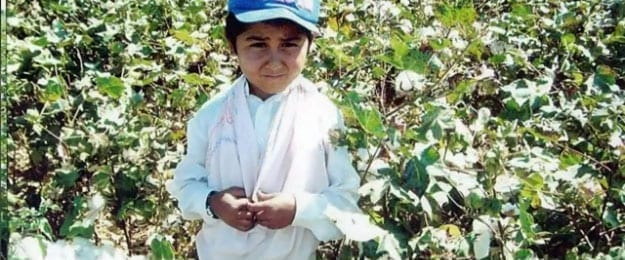A coalition of worker and human rights organizations, including the Solidarity Center, is urging the U.S. State Department to maintain Uzbekistan’s rank at the bottom of its “Trafficking in Persons” report when it is released this year. (Read the full document.)
“In 2014, the government of Uzbekistan forced more than a million citizens to work in the cotton fields under threat of penalty, for its benefit, and as a matter of state policy,” the groups write in a 15-page document detailing the Uzbekistan government’s coercion of public servants and other workers—including children—to toil in cotton fields.
The document notes that at least 17 people died due to unsafe working conditions during last fall’s harvest. Workers forced to pick cotton were not given any time off—including weekends and holidays. Organizations monitoring the harvest reported that workers were provided with no protective gear, such as gloves.
Public organizations, including schools, were required to provide between 30 percent and 60 percent of their staff for the duration of the harvest, and in some cases, up to 80 percent of their staff. Children often had no classes during these weeks because teachers were working in the fields. Clinics and hospitals had few or no medical personnel.
Many employees were threatened with loss of employment, loss of utilities and other public services, social exclusion, fines, administrative harassment, and criminal prosecution if they did not participate in the cotton harvest, the report states.
The 2014 Trafficking in Persons report gave Uzbekistan a “Tier 3” ranking, a designation that indicates a country is not complying with the U.S. Trafficking Victims Protection Act’s minimum standards nor making attempts to do so. The coalition says that maintaining the Tier 3 ranking is essential to convey to the Uzbekistan government the need to end forced labor.
A Tier 3 ranking makes countries liable to sanctions, which could include the withholding or withdrawal of U.S. non-humanitarian and non-trade-related assistance.
The coalition further notes that “the government of Uzbekistan’s use of forced labor to produce cotton is supported by its denial of fundamental rights of association, freedom of press and due process to enable its use of forced labor to produce cotton.”
The 2014 Trafficking in Persons report found that Uzbekistan’s “government-compelled forced labor of men, women, and children remains endemic during the annual cotton harvest….There were reports that some children aged 15 to 17 faced expulsion from school for refusing to pick cotton.”
Uzbekistan also was at the bottom of the 2014 Findings on the “Worst Forms of Child Labor” report released in October by the U.S. Labor Department.

